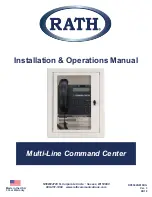
C H A P T E R
3-1
Cisco Unified IP Phone 7960G and 7940G Administration Guide for Release 8.0 (SIP)
OL-7890-01
3
Initializing Cisco Unified IP Phones
This chapter describes the initial firmware installation tasks and configuration process for the Cisco
Unified IP Phone 7960G and 7940G in a Session Initiation Protocol (SIP) network. It provides
information on the following:
•
Prerequisites, page 3-1
•
Overview of the Initialization Process, page 3-3
•
About Configuration Files, page 3-3
•
How to Customize the Default Configuration File, page 3-4
•
How to Customize a Phone-Specific Configuration File, page 3-8
•
Configuring the SIP Parameters Manually, page 3-10
•
How to Set the Date and Time, page 3-18
•
How to Create Dial Plans, page 3-23
•
How to Verify Initialization, page 3-27
•
Where to Go Next, page 3-28
Prerequisites
Ensure that your network meets the following requirements:
•
A working IP network is established and configured for SIP.
For information on configuring IP, refer to the
Cisco IOS IP Configuration Guide
.
http://www.cisco.com/univercd/cc/td/doc/product/software/ios123/123cgcr/ip_vcg.htm
•
VoIP is configured on your Cisco routers.
For information on configuring VoIP, refer to the
Cisco IOS Voice Configuration Library
.
http://www.cisco.com/univercd/cc/td/doc/product/software/ios123/123cgcr/vcl.htm
VoIP gateways are configured for SIP.
•
A TFTP server is configured on your network and has the files that the phone requests.
Note
Files are available from cisco.com.
When the phone initializes, it requests the following from the TFTP server:
















































